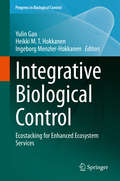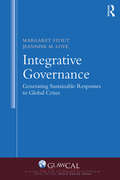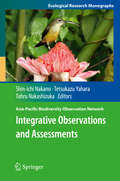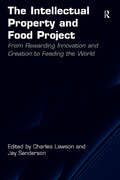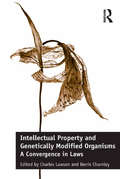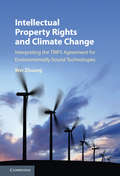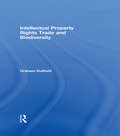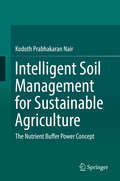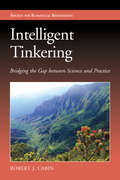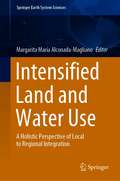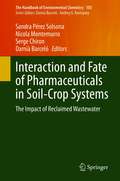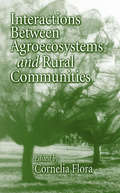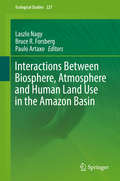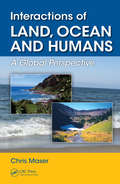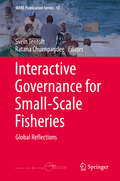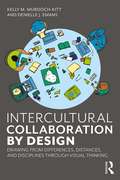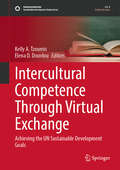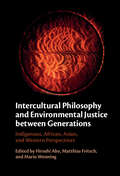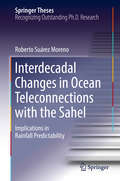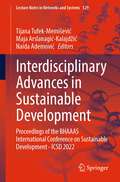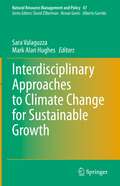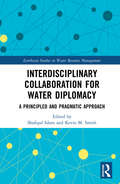- Table View
- List View
Integration Through Law: Sustainable Goals?
by Kheng-Lian Koh Robinson Nicholas A. Lin-Heng LyeWhile the environmental performance of most ASEAN member states is above the world average, ASEAN nations will continue to face growing environmental challenges due to pressures exerted on them such as population growth, urbanization and industrialization. The authors of this book look at how the member states of ASEAN employ law as a means of regional integration within the context of environmental conservation. While the goal of new laws is to implement sustainable development, it continues to be an ongoing adaptive process, since clear and immediate answers to environmental challenges are rarely available. Readers of this book will gain a clear idea of the evolving cooperation for sustainability within ASEAN at regional and global levels, and the areas of focus for the future. The book will be of interest to policy and decision makers, as well as environmental organizations and academics in the field.
Integrative Biological Control: Ecostacking for Enhanced Ecosystem Services (Progress in Biological Control #20)
by Yulin Gao Heikki M. T. Hokkanen Ingeborg Menzler-HokkanenThis book is the first to integrate biological control into a conceptual framework – ecostacking - uniting all aspects of biological control and ecosystem services. In 2018 the "First International Congress of Biological Control" was organised and held in Beijing, China. The chapters highlight some of the achievements presented at the congress, worldwide. Of particular significance are the numerous contributions by Chinese researchers illustrating the remarkable progress made on developing and adopting multiple biological control strategies over vast agricultural areas, largely replacing chemical pesticides for sustainable agricultural and horticultural production. In many parts of the world including Europe, fragmented research based on short-term funding has been unable to answer to the needs to develop sustainable long-term solutions to crop protection, while colleagues in China have been successful in implementing programs that exemplify the power of the ecostacking approach. Key contributions by European and US specialists combined with the expertise and experiences by the Chinese contributors comprise the building blocks for the integration of biological control approaches into the overall frame of ecostacking. This book will lead the way to a broader, integrated adoption of biological control techniques in sustainable pest, disease and weed management supporting also the functioning of other key ecosystem services.Chapter 2 of this book isavailable openaccess under a CC BY 4.0 license at link.springer.com
Integrative Governance: Generating Sustainable Responses To Global Crises (Global Law and Sustainable Development)
by Margaret Stout Jeannine M. LoveDominant governance theories are drawn primarily from Euro-American sources, including emergent theories of network and collaborative governance. The authors contest this narrow view and seek a more globally inclusive and transdisciplinary perspective, arguing such an approach is more fruitful in addressing the wicked problems of sustainability—including social, economic, and environmental crises. This book thus offers and affirms an innovative governance approach that may hold more promise as a "universal" framework that is not colonizing in nature due to its grounding in relational process assumptions and practices. Using a comprehensive Governance Typology that encompasses ontological assumptions, psychosocial theory, epistemological concepts, belief systems, ethical concepts, political theory, economic theory, and administrative theory, the authors delve deeply into underlying philosophical commitments and carry them into practice through an approach they call Integrative Governance. The authors consider ways this approach to radical self-governance is already being implemented in the prefigurative politics of contemporary social movements, and they invite scholars and activists to: imagine governance in contexts of social, economic, and environmental interconnectedness; to use the ideal-type as an evaluative tool against which to measure practice; and to pursue paradigmatic change through collaborative praxis.
Integrative Observations and Assessments
by Shin Ichi Nakano Tetsukazu Yahara Tohru NakashizukaThis volume focuses on new trends in monitoring biodiversity in the Asia-Pacific region, one of the most rapidly changing areas in the world. It provides reviews of the challenges in studying the spatial variability of biodiversity across various ecosystems. This book also describes newly developed concepts and methods for biodiversity observation including ubiquitous genotyping, systematic conservation, monitoring of the functions and services of ecosystems and biodiversity informatics. These contributions will lead to establishing integrative observations and assessments of biodiversity, essential for reporting the current status and for the effective conservation and sustainable use of biodiversity. This work will interest biodiversity researchers not only in the Asia-Pacific region but also across the entire globe.
Intellectual Property and Clean Energy: The Paris Agreement and Climate Justice
by Matthew RimmerThis collection considers the future of climate innovation after the Paris Agreement. It analyses the debate over intellectual property and climate change in a range of forums – including the climate talks, the World Trade Organization, and the World Intellectual Property Organization, as well as multilateral institutions dealing with food, health, and biodiversity. The book investigates the critical role patent law plays in providing incentives for renewable energy and access to critical inventions for the greater public good, as well as plant breeders’ rights and their impact upon food security and climate change. Also considered is how access to genetic resources raises questions about biodiversity and climate change. This collection also explores the significant impact of trademark law in terms of green trademarks, eco labels, and greenwashing. The key role played by copyright law in respect of access to environmental information is also considered. The book also looks at deadlocks in the debate over intellectual property and climate change, and provides theoretical, policy, and practical solutions to overcome such impasses.
The Intellectual Property and Food Project: From Rewarding Innovation and Creation to Feeding the World
by Jay Sanderson Charles LawsonThe relationship between intellectual property and food affects the production and availability of food by regulating dealings in products, processes, innovations, information and data. With increasingly intricate relations between international and domestic law, as well as practices and conventions, intellectual property and food interact in many different ways. This volume is a timely consideration and assessment of some of the more contentious and complex issues found in this relationship, such as genetic technology, public research and food security, socio-economic factors and the root cause of poverty and patent-busting. The contributions are from leading scholars in this emerging field and each chapter foregrounds some of the key developments in the area, exploring historical, doctrinal and theoretical issues in the field while at the same time developing new ideas and perspectives around intellectual property and food. The collection will be a useful resource in leading further discussion and debate about intellectual property law and food.
Intellectual Property and Genetically Modified Organisms: A Convergence in Laws
by Charles Lawson Berris CharnleyTaking a global viewpoint, this volume addresses issues arising from recent developments in the enduring and topical debates over Genetically Modified Organisms (GMOs) and their relationship to Intellectual Property (IP). The work examines changing responses to the growing acceptance and prevalence of GMOs. Drawing together perspectives from several of the leading international scholars in this area, the contributions seek to break away from analysis of safety and regulation and examine the diversity of ways the law and GMOs have become entangled. This collection presents the start of a much broader engagement with GMOs and law. As GMO technology becomes increasingly more complex and embedded in our lives, this volume will be a useful resource in leading further discussion and debate about GMOs in academia, in government and among those working on future policy.
Intellectual Property Rights and Climate Change: Interpreting the TRIPS Agreement for Environmentally Sound Technologies
by Wei ZhuangAs the world confronts global warming, there is a growing consensus that the TRIPS Agreement could be a more effective instrument for mitigating climate change. In this innovative work, Wei Zhuang systematically examines the contextual elements that can be used in the interpretation of the TRIPS Agreement with a view to enhancing innovation and transfer of environmentally sound technologies. Zhuang proposes a balanced and pro-competitive interpretation that could be pursued by policy makers and negotiators. This comprehensive, multidisciplinary study will help academics and policymakers improve their understanding of the contemporary international legal regimes governing intellectual property rights and innovation and transfer of environmentally sound technologies. It also offers practical guidance for further developing a legal system capable of responding to the challenges posed by climate change.
Intellectual Property Rights Trade and Biodiversity: Seeds And Plant Varieties
by Graham DutfieldThis text examines the international agreements governing trade in genetic resources - crucial resources for world agriculture, food security and large industries such as pharmaceuticals. Intellectual Property Rights (IPRs) in these resources are critical for those involved in the trade, including industry and developing countries. The book analyzes the Convention on Biological Diversity (CBD), World Trade Organization agreements and other agreements. It explains how they can be integrated into an equitable training regime.
The Intelligence of Flowers
by Maurice MaeterlinckWinner of the 2008 Prix de la Traduction Littéraire presented by French Community of BelgiumThe second of Maeterlinck's four celebrated nature essays—along with those on the life of the bee, ant, and termite—"The Intelligence of Flowers" (1907) represents his impassioned attempt to popularize scientific knowledge for an international audience. Writing with characteristic eloquence, Maeterlinck asserts that flowers possess the power of thought without knowledge, a capacity that constitutes a form of intelligence. Appearing one hundred years after the first publication, Philip Mosley's new translation of the original French essay, and the related essay "Scents," maintains the verve of Maeterlinck's prose and renders it accessible to the present-day reader. This is a book for those who are excited by creative encounters between literature and science as well as current debates on the relationship of humankind to the natural world.
Intelligent Soil Management for Sustainable Agriculture: The Nutrient Buffer Power Concept
by Kodoth Prabhakaran NairThis book conceptualizes a revolutionary idea based on a mechanistic-mathematical model in which the “Buffer Power” of the principal and problematic nutrients like phosphorus, potassium and zinc is quantified. This is achieved by using either a very sophisticated technique, electro-ultra-filtration, or a simple adsorption-desorption equilibrium technique, and by integrating the “Buffer Power” of the nutrient in question into the computations, accurate fertilizer recommendations are made. This technique was field tested across Europe, (Germany and Belgium), Africa (The Republic of Cameroon), and Asia (both Central Asia- Turkey and South Asia-India), during a period of three decades in test crops, such as, summer rye (Secale cereale), maize (Zea mays), wheat (Triticum aestivum), white clover (Trifolium repens), a highly nutritious and palatable fodder crop for Africa, black pepper (Piper nigrum) and cardamom (Elettaria cardamomum). Remarkable precision in predictability of plant uptake of phosphorus, potassium and zinc was obtained employing the technique.“The Nutrient Buffer Power Concept” project was shortlisted for the very prestigious U.S. $1 Million Rolex Awards For Enterprise of The Rolex Foundation, Geneva, Switzerland, for its outstanding originality and quality from more than 3500 nominations worldwide and is the only project chosen for this very coveted distinction from the Asian continent.
Intelligent Tinkering: Bridging the Gap between Science and Practice (Science Practice Ecological Restoration)
by Robert J. CabinRobert J. Cabin explores the relationship between science and practice in ecological restoration. Despite the often distinct cultures and methodologies of scientists and practitioners, Cabin shows how each has a vital role in effective restoration and offers suggestions for improving working relationships. One approach he advocates is what he calls "intelligent tinkering," where practitioners employ the same kind of careful but informal trial-and-error strategy followed by such groups as indigenous peoples and hobbyist mechanics. Cabin illustrates the power of intelligent tinkering using examples from his own work and other restoration projects. The gap between science and practice is a widespread problem across all fields of applied science. Intelligent Tinkering offers an insightful look at the underlying causes of the problem, along with invaluable suggestions for addressing it.
Intensified Land and Water Use: A Holistic Perspective of Local to Regional Integration (Springer Earth System Sciences)
by Margarita María Alconada-MaglianoThis book combines multidisciplinary studies on the environmental consequences of intensified use of land and water, and the fusion of land to provide food for a growing population. Studies on water, vegetation, and soil are addressed from an environmental management perspective with a special focus on the relation between natural elements and humans. This book considers the essential dynamics of humans and the natural environment, which is especially important in areas with shallow water-table that influence directly on agricultural activities (crops, livestock, and forests), land management, flooding, droughts, waterlogging, salt-affected soils (saline and sodic) and variation in obtained water quality in wells where these processes as related to the local and regional geomorphology control. The studies present hydrological processes towards the definition of an adequate use of soil and water with consequences of its management on the environment. Also, water study procedures are presented as well as their relation to other elements of the landscape. Methodologies such as the Tóthian flow system concept are recognized by different authors to provide the reader with solid interdisciplinary analyses of related environmental components such as soils, vegetation, surface water, geomorphology, geological framework and groundwater physical-chemical composition.
Interaction and Fate of Pharmaceuticals in Soil-Crop Systems: The Impact of Reclaimed Wastewater (The Handbook of Environmental Chemistry #103)
by Sandra Pérez Solsona Nicola Montemurro Serge Chiron Damià BarcelóThis book provides a comprehensive overview of the current knowledge on the fate and interaction of pharmaceuticals in soil-crop systems. It addresses the principles of their transport, uptake and metabolism and reviews methodologies for their analytical determination. It also discusses ecotoxicological effects arising from their presence and highlights bioremediation approaches for their removal. The use of treated wastewater to irrigate crops is becoming more widespread in regions where freshwater is limited. This practice conserves freshwater resources and contributes to nutrient recycling. However, concerns remain regarding the safety of irrigation with treated wastewater since it contains residues of pharmaceuticals that have survived treatment, which means that soil and fauna are potentially exposed to these xenobiotics. Various pathways govern the fate of pharmaceuticals in crop-soil systems, including soil degradation; formation of non-extractable residues; uptake by soil-dwelling organisms (e.g. earthworms); and uptake, transport, and metabolism in agricultural crops. Investigations into these aspects have only recently been initiated, and there is still a long way to go before a meaningful assessment of the impact of wastewater has been completed.
Interactions Between Agroecosystems and Rural Communities (Advances in Agroecology)
by Cornelia FloraThere is an increasing realization among biophysical scientists that human behavior drastically impacts the degree to which sound agroecosystems are implemented. Written by an international team of experts assembled by a leading rural sociologist, Interactions Between Agroecosystems and Rural Communities shows how human behavior impacts agroecosyst
Interactions Between Biosphere, Atmosphere and Human Land Use in the Amazon Basin
by Laszlo Nagy Bruce R. Forsberg Paulo ArtaxoThis book offers apanorama of recent scientific achievements produced through the framework of theLarge-Scale Biosphere-Atmosphere programme (LBA) and other research programmesin the Brazilian Amazon. The content is highly interdisciplinary, with an overarchingaim to contribute to the understanding of the dynamic biophysical andsocietal/socio-economic structure and functioning of Amazonia as a regionalentity and its regional and global climatic teleconnections. The targetreadership includes advanced undergraduate and post-graduate students andresearchers seeking to untangle the gamut of interactions that the Amazon's complexbiophysical and social system represent.
Interactions of Land, Ocean and Humans: A Global Perspective
by Chris MaserWritten by Chris Maser, one of the architects of the sustainability movement, Interactions of Land, Ocean and Humans: A Global Perspective explores a critical number of the myriad aspects that comprise the great, reciprocal feedback loops between the mountain peaks, the deep sea, and everywhere in between. Maser's exploration of these connections g
Interactive Governance for Small-Scale Fisheries
by Svein Jentoft Ratana ChuenpagdeeDrawing on more than 30 case studies from around the world, this book offers a multitude of examples for improving the governance of small-scale fisheries. Contributors from some 36 countries argue that reform, transformation and innovation are vital to achieving sustainable small-scale fisheries - especially for mitigating the threats and vulnerabilities of global change. For this to happen, governing systems must be context-specific and the governability of small-scale fisheries properly assessed. The volume corresponds well with the Voluntary Guidelines for Securing Sustainable Small-Scale Fisheries adopted in 2014, spearheaded by the United Nations Food and Agriculture Organization (FAO). These affirm the importance of small-scale fisheries for food security, nutrition, livelihoods, rural development and poverty reduction. The book arises from the project Too Big To Ignore: Global Partnership for Small-Scale Fisheries Research (TBTI). "A nuanced, diverse, vibrant and local-specific collection of essays - just as the small-scale fisheries around the world - dealt with by this versatile array of authors. Following on the heels of the recently adopted FAO Small-Scale Fisheries Guidelines, here is an erudite compendium which I heartily recommend to policy makers, academics and activists who wish to come to terms with the complex issue of governance of this important field of human activity. " John Kurien - Founding Member of the International Collective in Support of Fishworkers (ICSF), and Former Professor, Centre for Development Studies, Trivandrum, India "Likely to become a classic in its field, this book is about small-scale fisheries and interactive governance - governance which is negotiated, deliberated upon, and communicated among stakeholders who often share governing responsibilities. The authors show that interactive governance is not just a normative theory but a phenomenon that can be studied empirically, here with 34 case studies from as many countries around the world, north and south, east and west. Such "force of example" enables the editors to put together well-developed arguments and sometimes surprising conclusions about the way ahead. A must-read for managers, practitioners, stakeholders, and students!" Fikret Berkes - University of Manitoba, Canada, and author of Coasts for People
Intercultural Collaboration by Design: Drawing from Differences, Distances, and Disciplines Through Visual Thinking
by Kelly M. Murdoch-Kitt Denielle J. EmansIntercultural Collaboration by Design introduces a framework for collaborating across cultures and learning to use multicultural perspectives to address pressing global issues. This handbook helps people work, learn, and teach across cultures. Through the activities highlighted in this book, virtual and intercultural teams will find a practical route for initiating and sustaining productive work across disciplinary and social barriers. Teams can craft a plan to achieve their goals by selecting the activities that best meet their needs and interests. First-person anecdotes from the authors demonstrate how the activities encourage teams to embrace diverse perspectives in order to create innovative solutions. With over 30 hands-on activities, this book will be of great interest to diverse teams from a variety of disciplines who want to enhance intercultural learning and co-working. Whether in the classroom or workplace, the activities are appropriate for a variety of collaboration contexts, without a need for background in art or design.
Intercultural Competence Through Virtual Exchange: Achieving the UN Sustainable Development Goals (Sustainable Development Goals Series)
by Kelly A. Tzoumis Elena D. DouvlouThis book addresses the importance of sustainability and environmental worldviews and the role of intercultural competencies in achieving SDGs acceptance and their effective implementation. Particularly since the pandemic, there is a growth in online education, and this offers opportunities for educators and students that can be exploited with a focus on sustainability. The book provides examples of virtual exchange including Global South and Global North with tools ranging from Project-Based and Community-Based Service Learning, Debates, Environmental Games and Simulations, Virtual Reality/Augmented Reality, and Accessibility and DEI issues. Additionally, issues of social justice and digital colonialism are a thread through several of the chapters. By providing a broad range of global learning experiences from scholars across several continents from various disciplines that include various post-secondary education based on tools and best practices, the book is a great resource to academics, researchers, and students on approaches to education that prepare the learner for praxis and effective implementation of sustainable solutions for their professional and social future perspectives. Chapter "How can we raise global citizens at home: Evidence from an intercultural virtual collaboration between the Netherlands and Japan" is available open access under a via link.springer.com.>
Intercultural Philosophy and Environmental Justice between Generations: Indigenous, African, Asian, and Western Perspectives
by Hiroshi Abe Matthias Fritsch Mario WenningThis anthology combines an intercultural approach with intergenerational ethics to address critical environmental challenges. Written by scholars from all over the world, including Canada, the US, New Zealand, Nigeria, Ethiopia, Japan, the UK, China, and Spain, this book offers new perspectives on how to foster sustainable societal practises that draw on the past and are fair to future generations. It introduces the Māori idea that views all things and human generations in layered relations; Indigenous accounts of spiralling time and reciprocities among ancestors and descendants; the philosophical dimensions of Chinese conceptions of ancestor spirits and future ghosts; and African accounts of anamnestic solidarity among generations. These ideas influence proposals for how to confront ending worlds and address the environmental future of humanity, making this book a valuable resource for scholars and students of environmental law and policy, environmental humanities, political science, and intercultural and comparative philosophy, as well as policymakers.
Interdecadal Changes in Ocean Teleconnections with the Sahel: Implications in Rainfall Predictability (Springer Theses)
by Roberto Suárez MorenoIn tropical latitudes, monsoons trigger regimes of strong seasonal rainfall over the continents. Over the West African region, the rainfall has shown a strong variability from interannual to decadal time scales. The atmospheric response to global sea surface temperatures is the leading cause of rainfall variability in the West African Sahel. This thesis explores changes in the leading ocean forcing of Sahelian rainfall interannual variability. It anaylzes the dynamical mechanisms at work to explain the non-stationary sea surface temperature-forced response of anomalous rainfall. The underlying multidecadal sea surface temperature background is raised as a key factor that favors some interannual teleconnections and inhibits others. Results of this thesis are relevant for improving the seasonal predictability of summer rainfall in the Sahel.
Interdisciplinary Advances in Sustainable Development: Proceedings of the BHAAAS International Conference on Sustainable Development -ICSD 2022 (Lecture Notes in Networks and Systems #529)
by Tijana Tufek-Memišević Maja Arslanagić-Kalajdžić Naida AdemovićThis book presents interdisciplinary research and scientific outcomes in sustainable development acquired from the BHAAAS International Conference on Sustainable Development-ICSD2022 as part of the 13th Days of Bosnian-Herzegovinian American Academy of Arts and Sciences held in Sarajevo, June 23-26, 2022. The main event enabled researchers and experts from 25 countries to exchange their knowledge, ideas and experiences. The general scope of the book includes topics presented at three specialized symposia: The Quadruple Helix Approach, Sustainable Urban Development and Sustainable Civil Engineering with research topics ranging from SDGs, sustainable development education, environmental and social responsibility and consumption to sustainable retrofit strategies, urban heritage conservation, urban mobility, Space Syntax analysis, watercourse recovery, railway corridors and more. The book is recommended for fellow researchers, professionals, and students in the fields of economy, politics, architecture, urban planning, civil engineering and related fields.
Interdisciplinary Approaches to Climate Change for Sustainable Growth (Natural Resource Management and Policy #47)
by Sara Valaguzza Mark Alan HughesThe book is an edited collection of contributions by a distinguished international panel of academics on the main scientific, juridical, and economic aspects involved in the mitigation and adaptation processes imposed by climate change. Explicitly interdisciplinary, the book transversally cuts through different disciplines offering an outline of a phenomenon that is too often left to specific and sectorial insights. The volume is divided into four parts. The first part introduces the main concepts of the book: climate change and sustainability, wellbeing, and mitigation and adaptation. The second part presents the scientific understanding of climate change and explores some of the more pressing issues driving policy development, such as the melting of the glaciers and the impact on coastal areas. The third part discusses significant experiences in the environmental policies both in the European Union and in the United States of America. The last section explains possible approaches to climate change, by exploring the legal and economic aspects of both adversarial and more lenient approaches towards a more sustainable world. It faces four main issues in the economic and juridical context: consumer behaviors, climate litigations, environmental litigations and the alternative forms of dispute resolution on environmental matters, with particular regard to environmental mediation. Offering a new vision of sustainable policies, this volume will be of interest to researchers and students of environmental policy, resource economics, environmental law, sustainable development, and public administration, as well as practitioners and policy makers working in related areas.
Interdisciplinary Collaboration for Water Diplomacy: A Principled and Pragmatic Approach (Earthscan Studies in Water Resource Management)
by Shafiqul Islam Kevin M. SmithThis book introduces the concept of Water Diplomacy as a principled and pragmatic approach to problem-driven interdisciplinary collaboration, which has been developed as a response to pressing contemporary water challenges arising from the coupling of natural and human systems. The findings of the book are the result of a decade-long interdisciplinary experiment in conceiving, developing, and implementing an interdisciplinary graduate program on Water Diplomacy at Tufts University, USA. This has led to the development of the Water Diplomacy Framework, a shared framework for understanding, diagnosing, and communicating about complex water issues across disciplinary boundaries. This framework clarifies important distinctions between water systems - simple, complicated, or complex - and the attributes that these distinctions imply for how these problems can be addressed. In this book, the focus is on complex water issues and how they require a problem-driven rather than a theory-driven approach to interdisciplinary collaboration. Moreover, it is argued that conception of interdisciplinarity needs to go beyond collaboration among experts, because complex water problems demand inclusive stakeholder engagement, such as in fact-value deliberation, joint fact finding, collective decision making, and adaptive management. Water professionals working in such environments need to operate with both principles and pragmatism in order to achieve actionable, sustainable, and equitable outcomes. This book explores these ideas in more detail and demonstrates their efficacy through a diverse range of case studies. Reflections on the program are also included, from conceptualization through implementation and evaluation. This book offers critical lessons and case studies for researchers and practitioners working on complex water issues as well as important lessons for those looking to initiate, implement, or evaluate interdisciplinary programs to address other complex problems in any setting.

